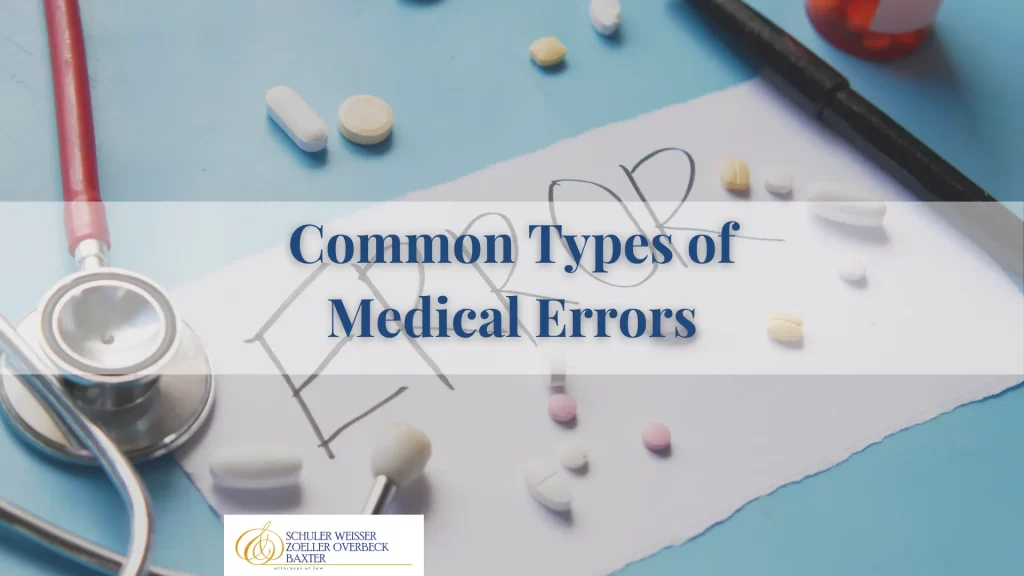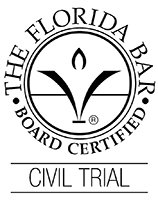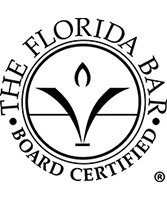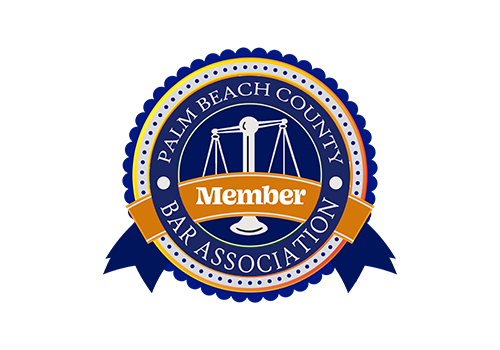Common Types of Medical Errors

When we go to the doctor, we expect healing, not to leave in a worse condition than when we arrived. Unfortunately, thousands of people in the United States may be affected by a medical error every year, ranging from prescribing a drug that interacts with other medications to having surgery on the wrong part of the body—or even on the wrong patient.
The most common medical errors below can occur in a hospital setting, doctor’s office, or long-term care facilities like nursing homes. Medical professionals are not infallible, and while mistakes can happen, sometimes the medical error is, in fact, the result of negligence or oversight. If you or someone you love suffered because of one of these types of medical errors, you could have grounds to file a lawsuit for medical malpractice. Call our offices today to learn about your options.
What Is a Medical Error?
An article published in the National Library of Medicine notes that medical errors fall into two categories:
- Errors of omission or medical errors occurring because of actions not taken (such as failing to run certain tests or not strapping a patient into a wheelchair)
- Errors of commission, or errors because the wrong action was taken (like leaving an item inside a patient after surgery)
Fear of punishment and job loss contributes to the under-reporting of medical errors. The patient isn’t aware of the error until they notice their health deteriorating.
The same article from the National Library of Medicine (NLM) notes that among the most common medical errors are:
Delayed Diagnosis or Misdiagnosis
A diagnostic error affects anywhere from 40,000 to 80,000 people every year. It occurs more often in solo-practice conditions, in which the doctor doesn’t have the opportunity to cross-reference with colleagues or other healthcare professionals easily. Misdiagnosis errors are less likely to happen in healthcare institutions, where patients are seen by multiple healthcare providers.
The most common form of this error is failing to order the right tests to diagnose the patient, followed by prematurely closing the diagnostic process (and not exploring further options). The third most common kind of diagnostic error is delayed treatment after the initial diagnosis. Failure to accurately read test results can also lead to misdiagnosis.
Hospital Acquired Infection
One in twenty people in a hospital setting in the U.S. develops an infection while being treated there, costing the country $35 billion annually. Patients’ infections largely occur due to a lack of sanitation protocols or adherence to protocols and basic cleanliness. Poor training or sanitation for Foley and other catheters is also a leading cause of hospital-acquired infections.
Wrong Medication
Medication errors often occur when the wrong information enters a patient’s chart. Handwritten information, including the medication type, dose, and frequency, may lead to more errors than barcoding and computerization. However, if the wrong information is entered initially, then errors can still happen.
Accidental overdose could be fatal, as could drug interactions. Sometimes, medication errors may result if the patient fails to disclose everything they’re taking, including over-the-counter meds and alternative treatments. Medical professionals need to know everything a patient is taking to avoid issues.
Falls and Dropped Patients
Falls and the accompanying injuries can be deadly, especially for the elderly population. Failure to use the right restraints or communicate the use of restraints is a common reason for falls. Understaffing is another one. Some patients may not wait for help with transfers, like going from bed to wheelchair or sitting to standing, and may try to move themselves independently.
Other preventable reasons for falls are improper lifting training and lack of staffing to perform patient lifts. Most lifts require two people and special techniques to avoid dropping the patient. Untrained healthcare attendants, or careless ones, could injure a patient.
Surgical Errors
At least 4,000 surgical errors occur in the U.S. each year. Surgery on the wrong body part is one of the most common medical errors. It’s not just human error that causes surgical mistakes. Using robotic equipment in surgery or surgical robots has resulted in increasing instances of hemorrhaging due to lacerations and other damage to the tissue surrounding the surgical site.
Surgical errors may be caused by a lack of training and rules and regulations for surgeries. Other reasons for surgical errors include communication gaps between surgeons and anesthetists, the surgical staff, or even between surgeons and patients.
Nursing Home Errors
 If a medical error occurred in a nursing home, it may not just be the fault of the healthcare worker who committed it. Problems with charting or logging resident information, including health conditions or medications, and negligent hiring on the part of the nursing home management.
If a medical error occurred in a nursing home, it may not just be the fault of the healthcare worker who committed it. Problems with charting or logging resident information, including health conditions or medications, and negligent hiring on the part of the nursing home management.
A nursing home resident could suffer injury from an improperly administered lift or a fall. Infections can quickly spread throughout a nursing home, too. Many residents with compromised immune systems or otherwise may be more likely to get sick. Lack of proper infection prevention protocol on the part of the nursing home and lack of adherence to the set standards by the staff may lead to an outbreak of deadly infections.
Have You Been a Victim of Medical Malpractice?
If you or a loved one have suffered further injury or a deteriorating medical condition due to one of these most common medical errors, we can help. The experienced West Palm Beach medical malpractice lawyers from Schuler, Weisser, Zoeller, Overbeck & Baxter P.A. work with injured patients and their families to secure the money they need to rectify the medical error. We can hold the negligent healthcare professionals liable for the harm they caused and may also name the healthcare facility where you were treated as a defendant.
Our mission is to fight for full and fair compensation for your losses so that you can heal and recover as much as possible. We offer a free consultation, so call us today at (561) 689-8180 to speak with our compassionate legal team members. Don’t go through it alone if you think you’ve been the victim of medical malpractice.
Related Posts:
Why Your Medical History Prior to the Accident Is So Important
Top Ways to Document Your Pain and Suffering
Why You Must File an Injury Claim ASAP










